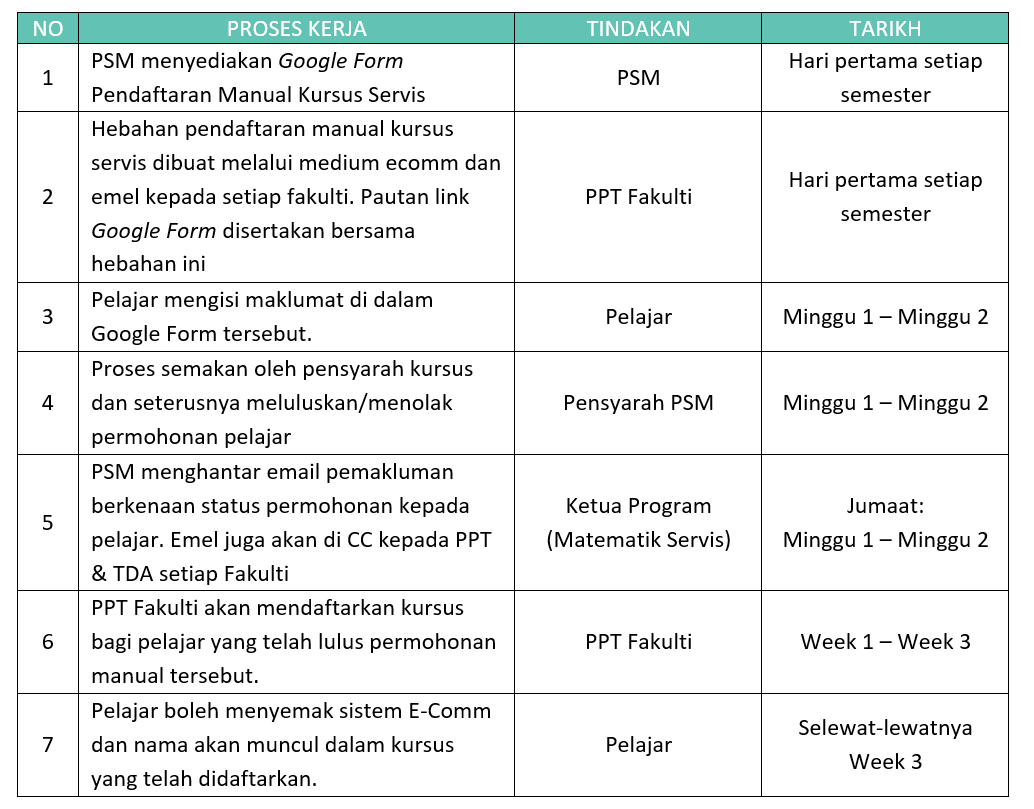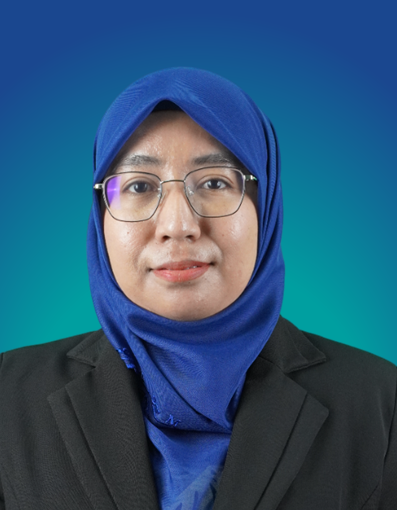- Overview
- Course Syllabus
- Mathematics Course by Programme
- Credit Transfer
- Manual Registration
- Head of Programme
Introduction
Mathematics service-courses are courses provided by Centre for Mathematical Sciences for students of disciplines other than mathematics, such as engineering, computer, industrial sciences, management, economic and many other disciplines.
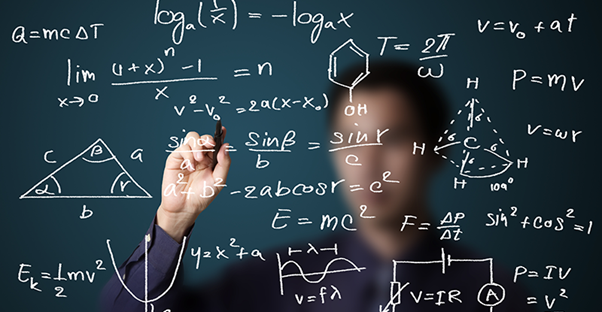
- Mathematics Courses for Degree Programme
- Mathematics Courses for Dual Degree Programme
- Mathematics Courses for Diploma Programme
Mathematics Courses for Degree
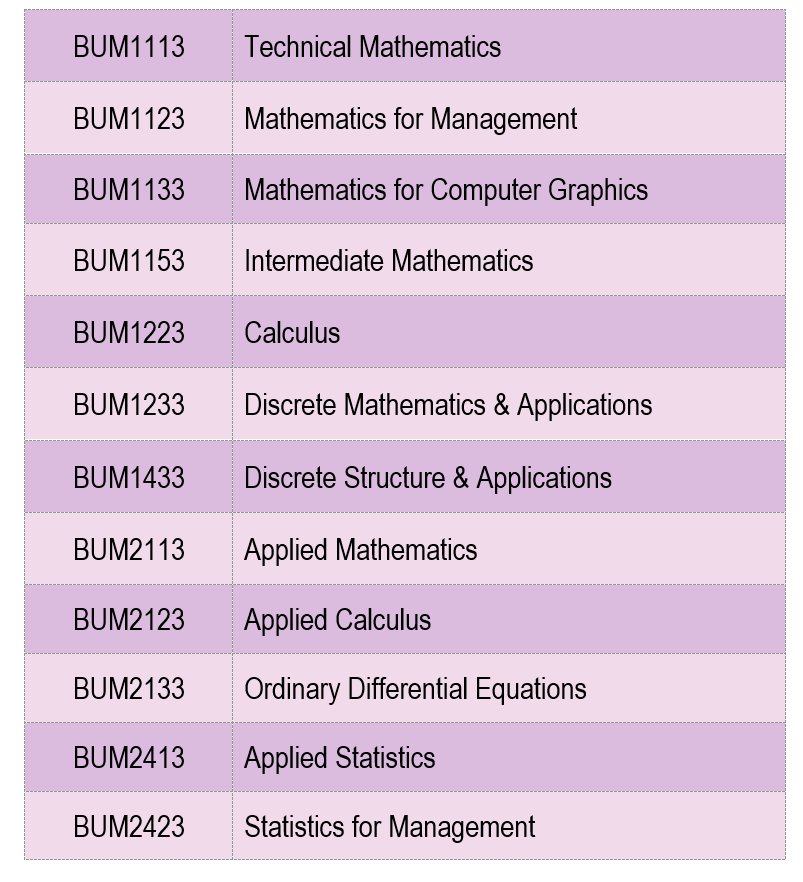
Mathematics Courses for Dual Degree

Mathematics Courses for Diploma
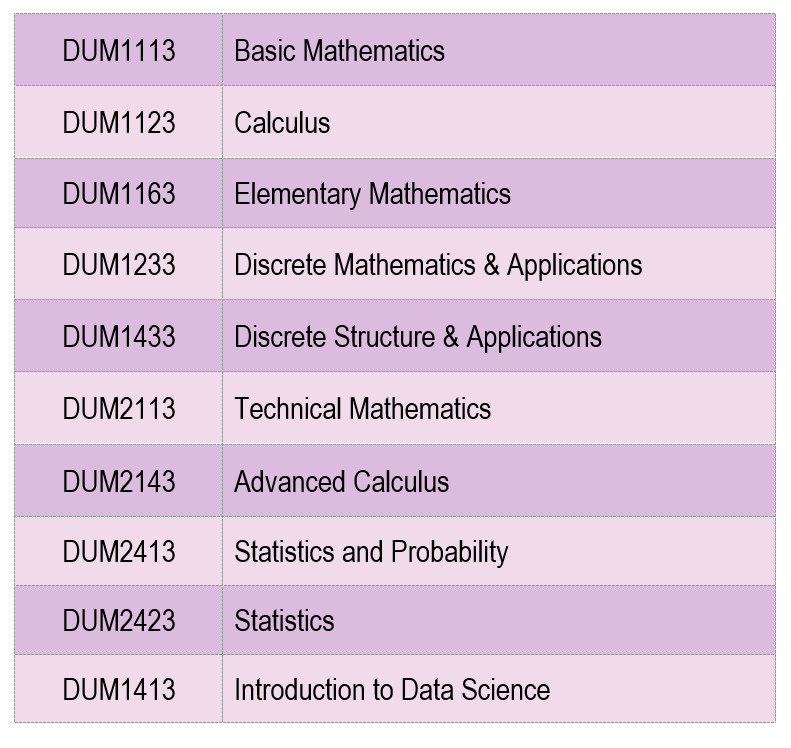
Degree Program
BUM2123 - APPLIED CALCULUS
CO2:Analyse and solve wide range of problems in science and engineering by using concept of calculus.
Programme: BAA, BEP, BKC, BMA, BMM, BSD, BSB, BSK, BSP, BFF, BFM, BHM, BHA
BUM2413 - APPLIED STATISTICS
Course Outcome
By the end of semester, students should be able to:
CO1:Acquire fundamental principle of statistics.
CO2:Perform statistical analysis by using appropriate statistical theory and methodology.
CO3:Analyse real life data to solve related problems in various disciplines.
Programme: BAA, BEP, BKC, BMA, BMM, BPN, BPD, BCS, BCN, BCG, BSD, BSB, BSK, BSP, BPS, BTC, BTF, BTO, BTW, BHA, BTM, BTI, BTX, BFF, BFM, BHM, BHA
BUM2133 - ORDINARY DIFFERENTIAL EQUATIONS
This course introduces to the Ordinary differential equations, Laplace transform and Fourier series and their applications in solving engineering problems.
Course Outcome
By the end of semester, students should be able to:
CO1:Acquire fundamental principle of first and second order ordinary differential equations, Laplace transforms and Fourier series.
CO2:Analyze and solve various differential equation of first order differential equations, second order differential equations, Laplace transforms and find Fourier series for various periodic functions.
Programme: BAA, BEP, BKC, BMA, BMM, BHA, BFF, BFM, BHM, BHA
BUM1113 - TECHNICAL MATHEMATICS
This course introduces and discusses the fundamental of mathematics focusing on providing a solid concept of foundation for further work. Student are exposed to functions and graphs, exponential and logarithmic functions, trigonometric functions, analytic trigonometry, polar coordinates, and conic sections. Appropriate software is used by students to implement some of these ideas in practice.
Course Outcome
By the end of semester, students should be able to:
CO1:Acquire fundamental principle of functions and trigonometric.
CO2:Apply appropriate mathematics concepts to solve various problems.
Programme: BPN, BPS, BTV, BTB, BTK, BTE, BTS, BTW, BTD, BTA, BTG, BTM, BTI, BTX
BUM1223 - CALCULUS
This course discusses in depth of functions and differentiation. Topics cover under this course are: The Concepts of Limit, Computation of Limit, continuity and Its Consequence, Derivative, Computation of derivative, The Product and Quotient Rule, The Chain Rule, Higher Derivatives, Implicit Differentiation, Rates of Change and Related Rates, Maximum and Minimum Values, Mean Value Theorem, Concavity and Second Derivatives Test, Overview of Curve Sketching, Optimization Problems, Anti derivatives, Indefinite Integral, Definite Integral, Integration by Substitution, Integration by Parts, Integration of Rational Function using Partial Fractions, Area Between Curves. Arc Length and Surface Area, Volume: Slicing Method, Volume: Disks Method, Volume by Cylindrical Shells.
Course Outcome
By the end of semester, students should be able to:
CO2:Apply appropriate calculus concepts to solve various technological problems.
Programme: BPN, BPD, BTC, BTV, BTB, BTF, BTK, BTO, BTE, BTS, BTW, BTA, BTD, BTG, BTM, BTI, BTX
BUM2113 - APPLIED MATHEMATICS
This course introduces ordinary differential equations (analytically and numerically), Laplace transforms and Fourier series. Related applications are also discussed.
Course Outcome
CO2:Analyze and solve various differential equation of first and second order differential equations, Laplace transforms and find Fourier series for various periodic functions.
Programme: BTV, BTB, BTF, BTK, BTO, BTE, BTS, BTW, BTD, BTA, BTG, BTM, BTI, BTX
BUM1123 - MATHEMATICS FOR MANAGEMENT
This subject introduces the use of mathematical technique in the field of business administration and management. The topics introduce to the inequality, matrices, functions and the key business topics such as simple interest, compound interest, promissory notes, trade and cash discount, markup and markdown.
Course Outcome
By the end of semester, students should be able to:
CO1:Acquire basic principles and methodologies of mathematics to solve problems.
CO2:Apply mathematical concepts and techniques in business administration, management and finance.
Programme: BPP, BPT
BUM2433 - STATISTICS FOR MANAGEMENT
This course discusses on descriptive statistics; graphical summary; common probability distributions; statistical analysis for means; regression and correlation including simple and multiple linear regressions, and goodness of fit test and contingency tables. Statistical packages such as Microsoft Excel, SPSS, R Language, S plus, EViews and Minitab shall be used in this course.
Course Outcome
By the end of semester, students should be able to:
CO1:Acquire fundamental principle of statistics.
CO2:Perform statistical analysis by using appropriate statistical theory and methodology.
CO3:Analyse real life data to solve related problems in various disciplines.
Programme: BPP, BPT
BUM1433 - DISCRETE STRUCTURE & APPLICATIONS
This subject introduces and discusses the fundamental of the discrete as apply to computer science, focusing on providing a basic theoretical foundation for further work. Students are exposed to basic counting; discrete probability; numerical, precision, accuracy and errors; graph; tress and modelling computations. This course integrates symbolic tools, graphical concepts and numerical calculations.
Course Outcome
By the end of semester, students should be able to:
CO1:Acquire fundamental principle of discrete structure.
CO2:Analyze mathematical problems using discrete structure knowledge.
CO3:Provide solution to discrete structure problems arise in computer science and engineering fields.
Programme: BCS, BCN, BCG
BUM1233 - DISCRETE MATHEMATICS & APPLICATIONS
Course Outcome
By the end of semester, students should be able to:
CO1:Acquire fundamental principle of discrete mathematics.
CO2:Analyze mathematical problem using discrete mathematics.
CO3:Provide solution to discrete mathematics problems arise from computer science and engineering field.
Programme: BCS, BCN, BCG
BUM1113 - MATHEMATICS FOR COMPUTER GRAPHIC
The aim of this course is to introduce and develop mathematical skills that underpin the technical aspects of computer graphics application. It will emphasize on matrix, vector, geometry and parametric representation, general concept of Basic Mathematics, Vector Calculus and Numerical Methods. For further understanding about this subject, a lot of exercises will be given. At the end of the course, students should be able to grasp key concept and uses each of the mathematical concept in computer graphics application. Appropriate software is used by students to implement some of these ideas in practice.
Course Outcome
By the end of semester, students should be able to:
CO1:Acquire fundamental principle of mathematics for computer science
CO2:Demonstrate the calculations through mathematical formulas and equations.
CO3:Provide solution for the wide range of problems in computer science by using mathematics principle.
Programme: BCG
BUM1153 - INTERMEDIATE MATHEMATICS
This course introduces and discusses the fundamental of mathematics focusing on providing a solid theoretical foundation for further work. Student are exposed to number system, equations, inequalities and absolute value, polynomials, sequences and series, matrices and system of linear equations, functions and graphs, and trigonometric functions. This course also integrates symbolic tools, graphical concepts, and numerical calculations.
Course Outcome
By the end of semester, students should be able to:
CO1:Acquire the fundamental principles of basic mathematics.
CO2:Apply the appropriate method to solve mathematical problems.
Programme: BCS, BCN, BCG
Diploma Program
DUM1113 - BASIC MATHEMATICS
This course introduces and discusses the fundamental of mathematics focusing on providing a solid theoretical foundation for further work. Student are exposed to number system, equations, inequalities and absolute value, polynomials, sequences and series, matrices and system of linear equations, functions and graphs, and trigonometric functions. This course also integrates symbolic tools, graphical concepts, and numerical calculations.
Course Outcome
By the end of semester, students should be able to:
CO1:Acquire the fundamental principles of basic mathematics.
CO2:Apply the appropriate method to solve mathematical problems.
Programme: DAA, DKC, DMM, DEE, DTM, DCS, DPS, DSI
DUM1123 - CALCULUS
Calculus is the mathematics of change, of calculating problems that are continually evolving. This is possible by breaking such problems into infinitesimal steps, solving each of those steps, and adding all the results. Rather than doing each step individually, calculus allows these computations to be done simultaneously. There are two primary branches of calculus: differential calculus (differentiation) and integral calculus (integration). Therefore, students are exposes to limits and continuity, differentiation, application of differentiation, integration, and application of integration. This course integrates symbolic tools, graphical concepts and numerical calculations.
Course Outcome
By the end of semester, students should be able to:
CO1:Acquire and apply the fundamental principles of calculus.CO2:Apply the appropriate method studied to solve mathematical problems.
CO3:Provide solution to solve mathematical problem arise from real life.
Programme: DAA, DKC, DMM, DEE, DTM, DCS, DSI
DUM2113 - TECHNICAL MATHEMATICS
This course introduces Analytic Geometry & Conic Section, Parametric Equations, Polar Coordinates, Three-Dimensional Spaces Vectors, and First Order Differential Equations. Appropriate software is used by students to implement some of these ideas in practice.
Course Outcome
By the end of semester, students should be able to:
CO1:Acquire fundamental principles of technical mathematics.
CO2:Apply the knowledge of Analytic Geometry & Conic Section, Parametric Equations, Polar Coordinates, Three-Dimensional Spaces, Vectors and First Order Differential Equations to solve various science and engineering problems.
Programme: DAA, DEE, DTM
DUM1213 - FUNDAMENTAL DISCRETE STRUCTURE
This course introduces and discusses the fundamental of the discrete as apply to computer science, focusing on providing a basic theoretical foundation for further work. Students are exposed to logic, set theory, elementary number theory, functions and relations, basic of counting, Boolean algebra, and proof techniques. This course integrates symbolic tools, graphical concepts, and numeral calculations.
Course Outcome
By the end of semester, students should be able to:
CO1:Acquire fundamental principle of discrete mathematics.
CO2:Analyze mathematical problem using discrete mathematics.
CO3:Provide solution to discrete mathematics problems arise from computer science and engineering field.
Programme: DCS
DUM2413 - STATISTICS & PROBABILITY
In this course, students are exposed to basic statistics and analyses statistically. The topics covered are introduction to statistics, descriptive statistics, probability, discrete probability distributions, continuous probability distributions, and correlation and simple linear regression.
Course Outcome
By the end of semester, students should be able to:
CO1:Acquire fundamental principle statistics.
CO2:Perform statistical analysis by using appropriate statistical theory and methodology.
CO3:Analyse real life data to solve related problems in various disciplines.
Programme: DMM, DPS, DSI, DCS
DUM2512 - INTRODUCTION TO DATA SCIENCE
Data science is the emerging interdisciplinary field that lies at the intersection of which requires the tools of extracting meaningful insights from the big data stored in the data sets. This course presents the overview of data science, big data, the process of data science, its infrastructure and computing for data science. This course is aimed to produce graduates who are knowledgeable, skilled and able to emerging technologies based on the knowledge of mathematics, statistics, computer science and domain expertise for storing, analysing and managing the big data.
Course Outcome
By the end of semester, students should be able to:
CO1:Explain the terminologies used in data science.CO2:Distinguish the data science basic foundation, process, infrastructure and required computing tools.
CO3:Communicate effectively in written and oral forms by completing the task given.
Programme: DSI
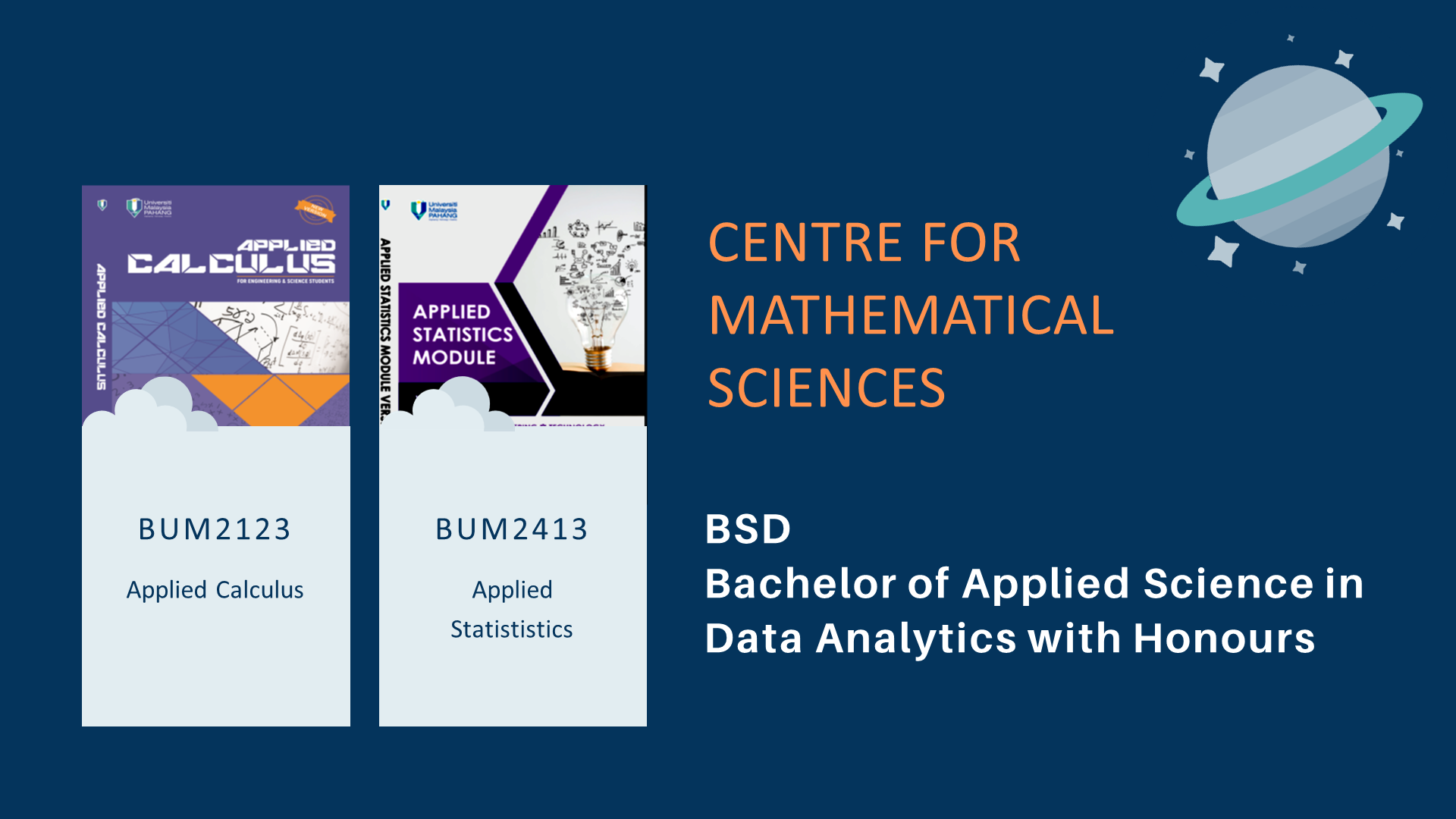
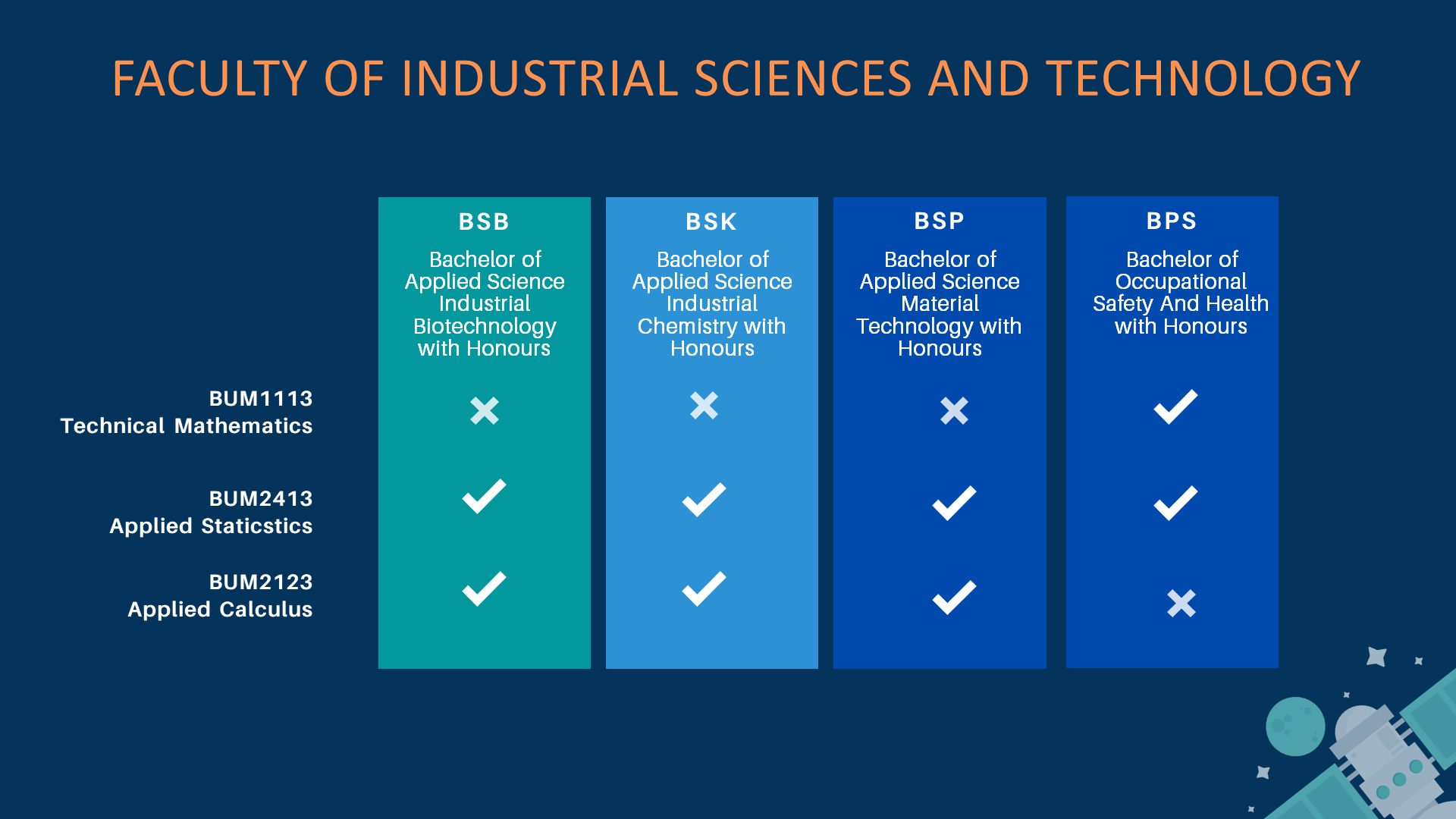
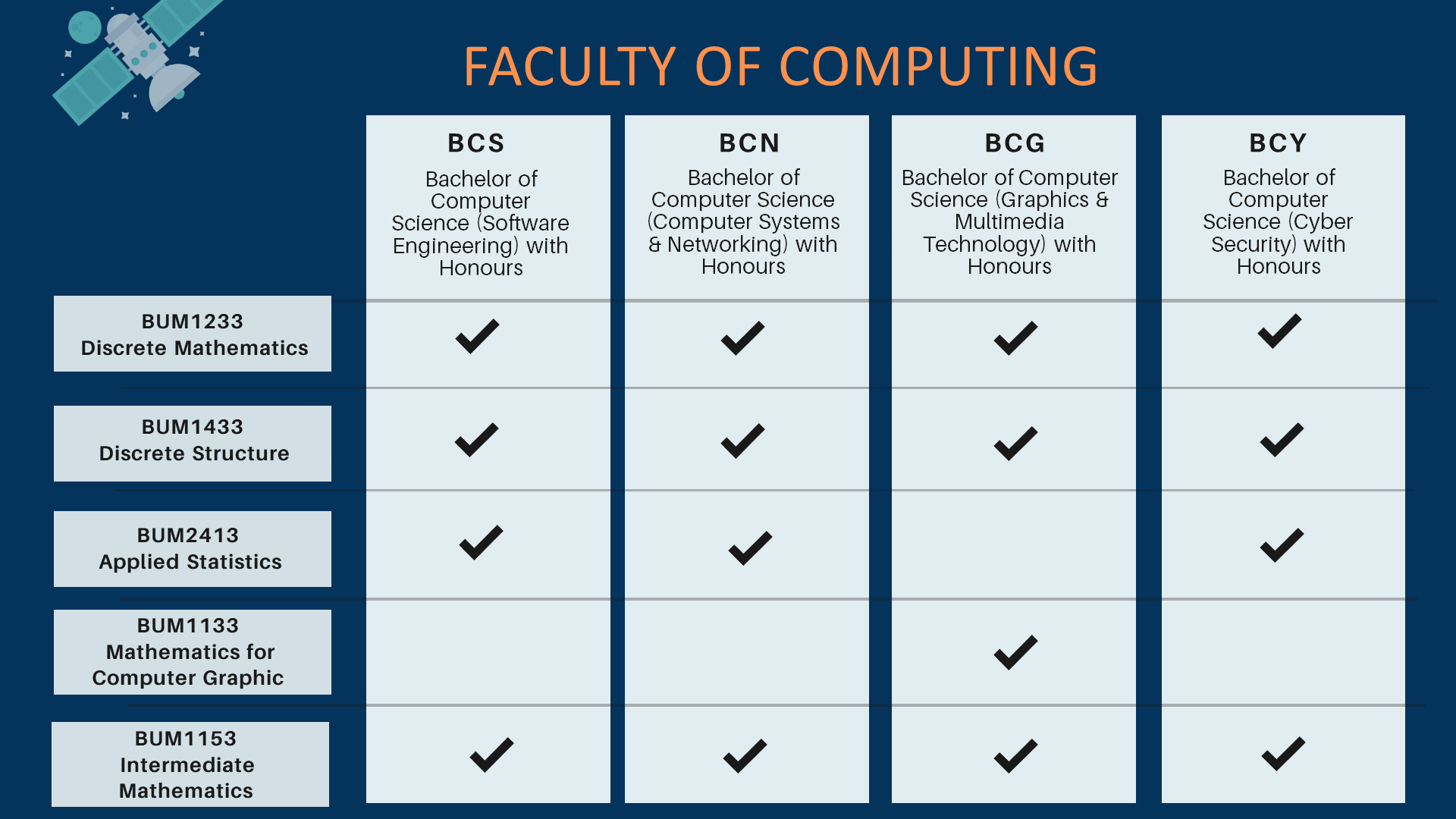
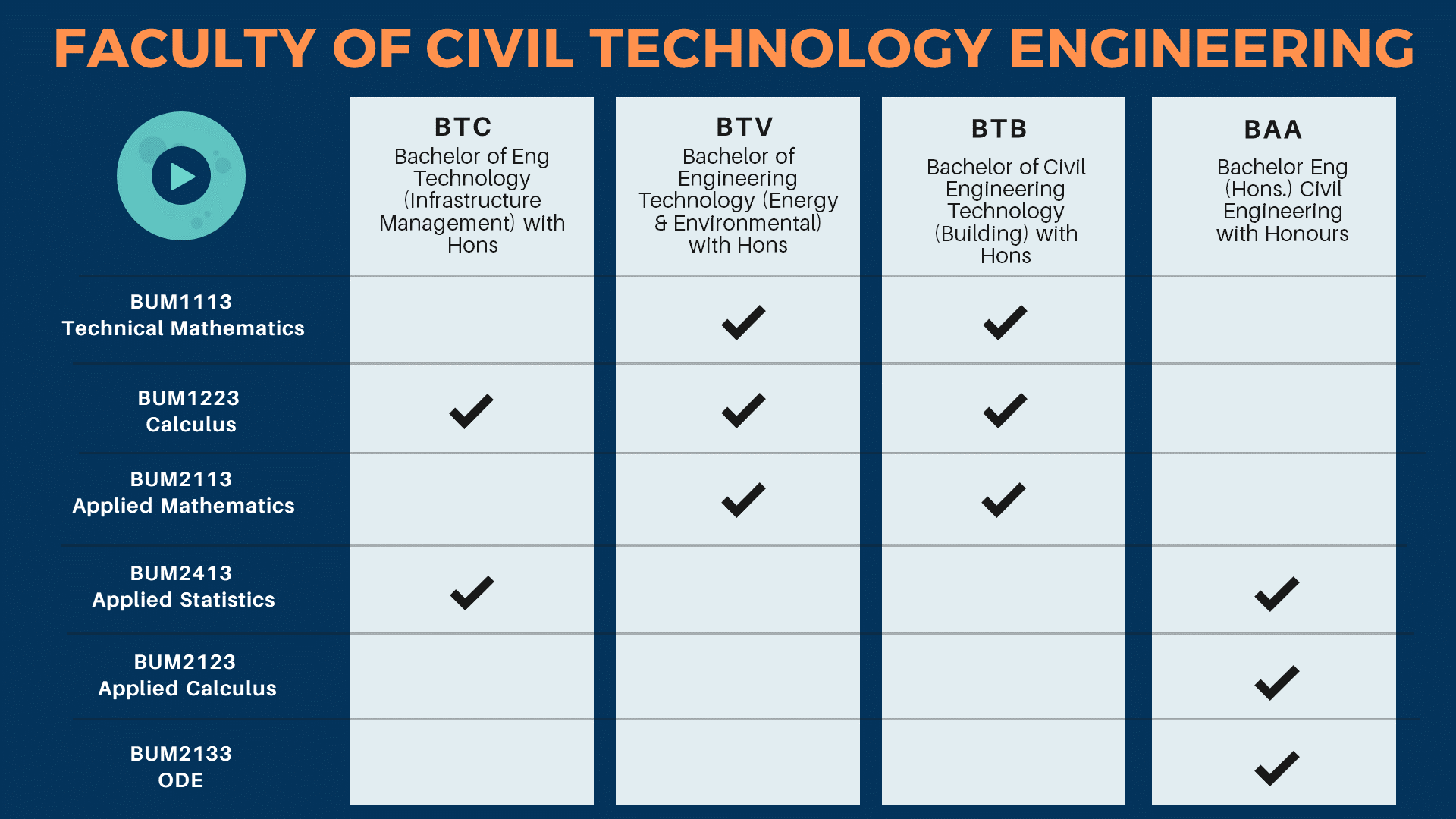
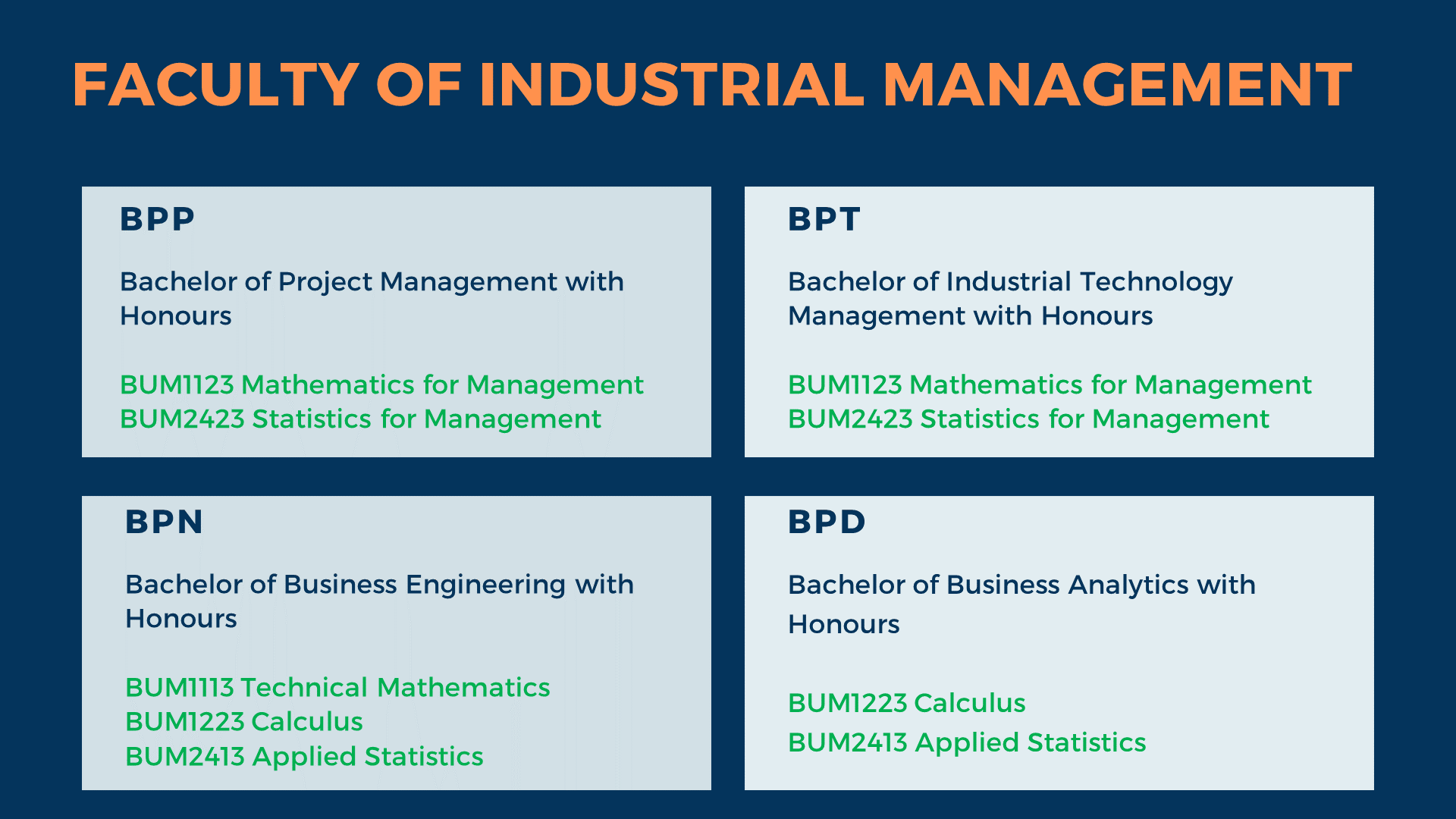
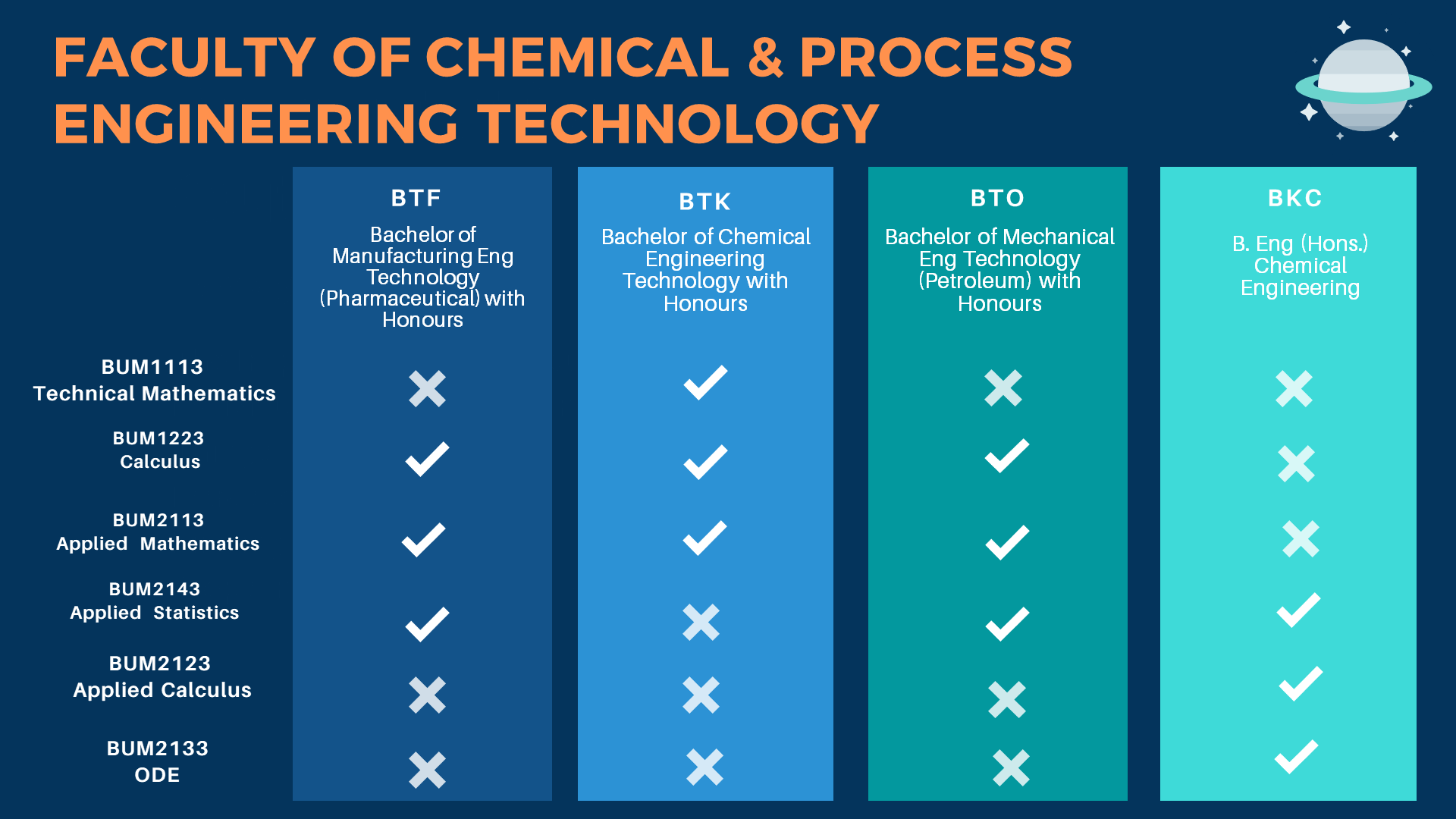
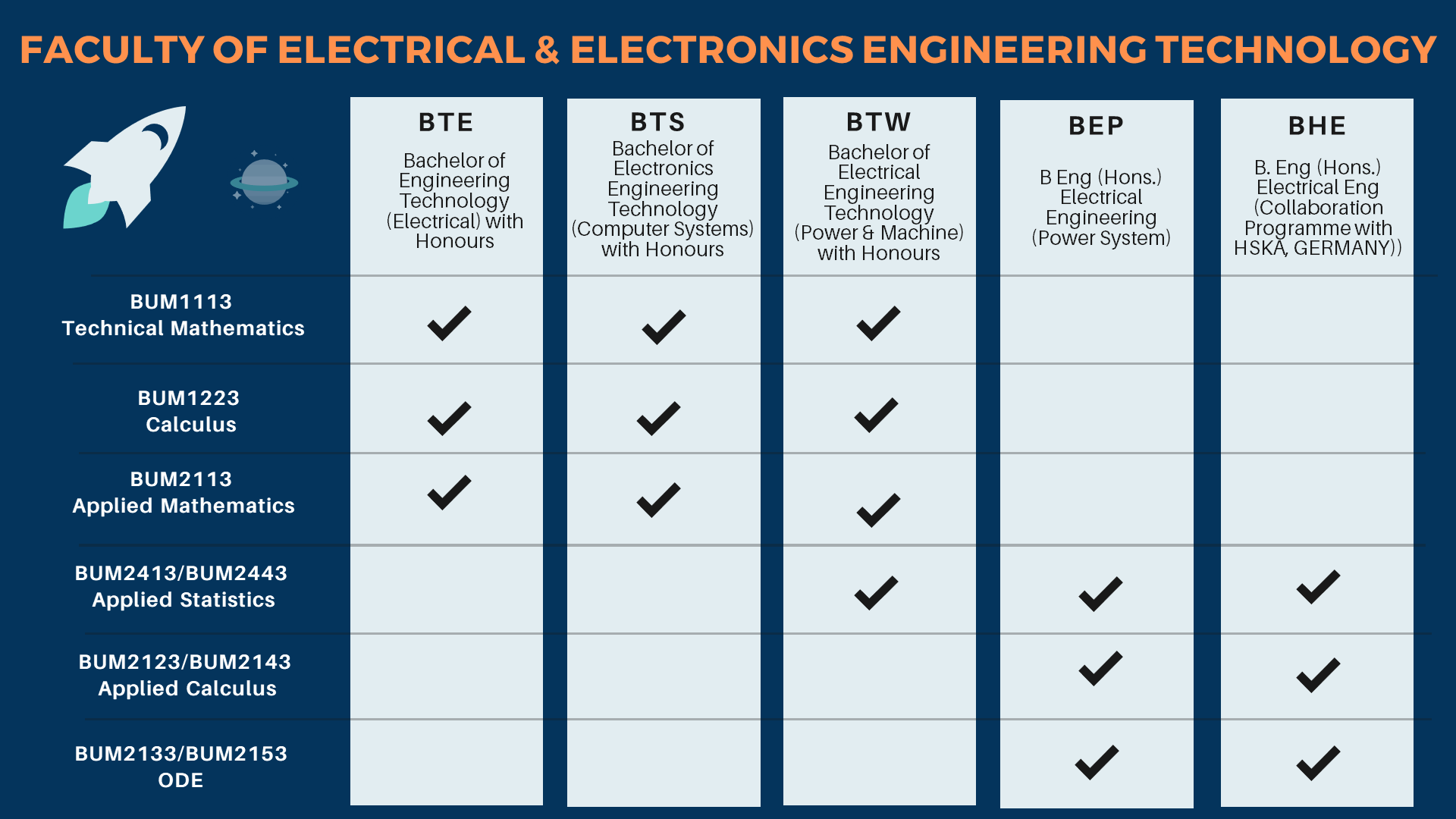
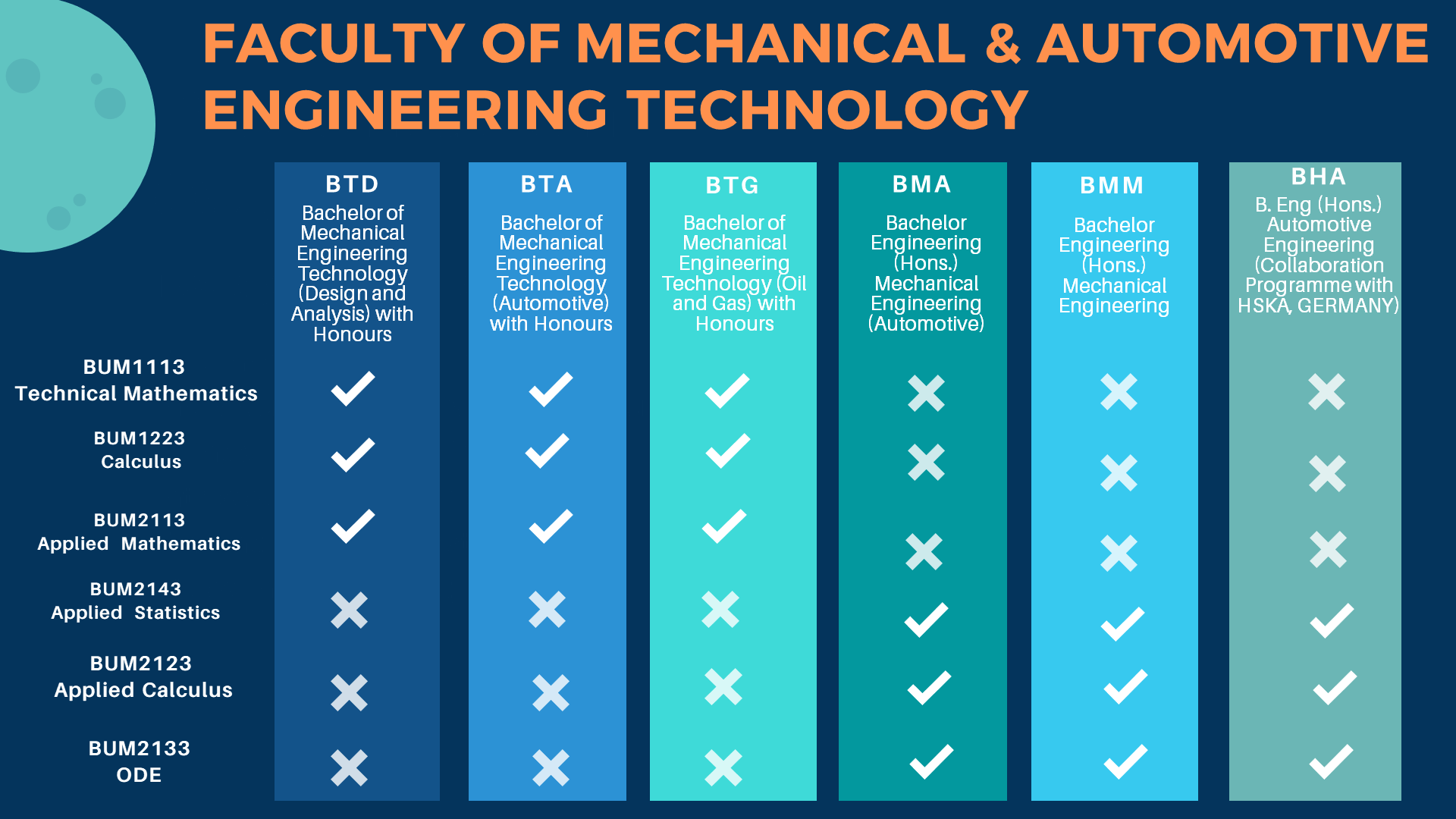
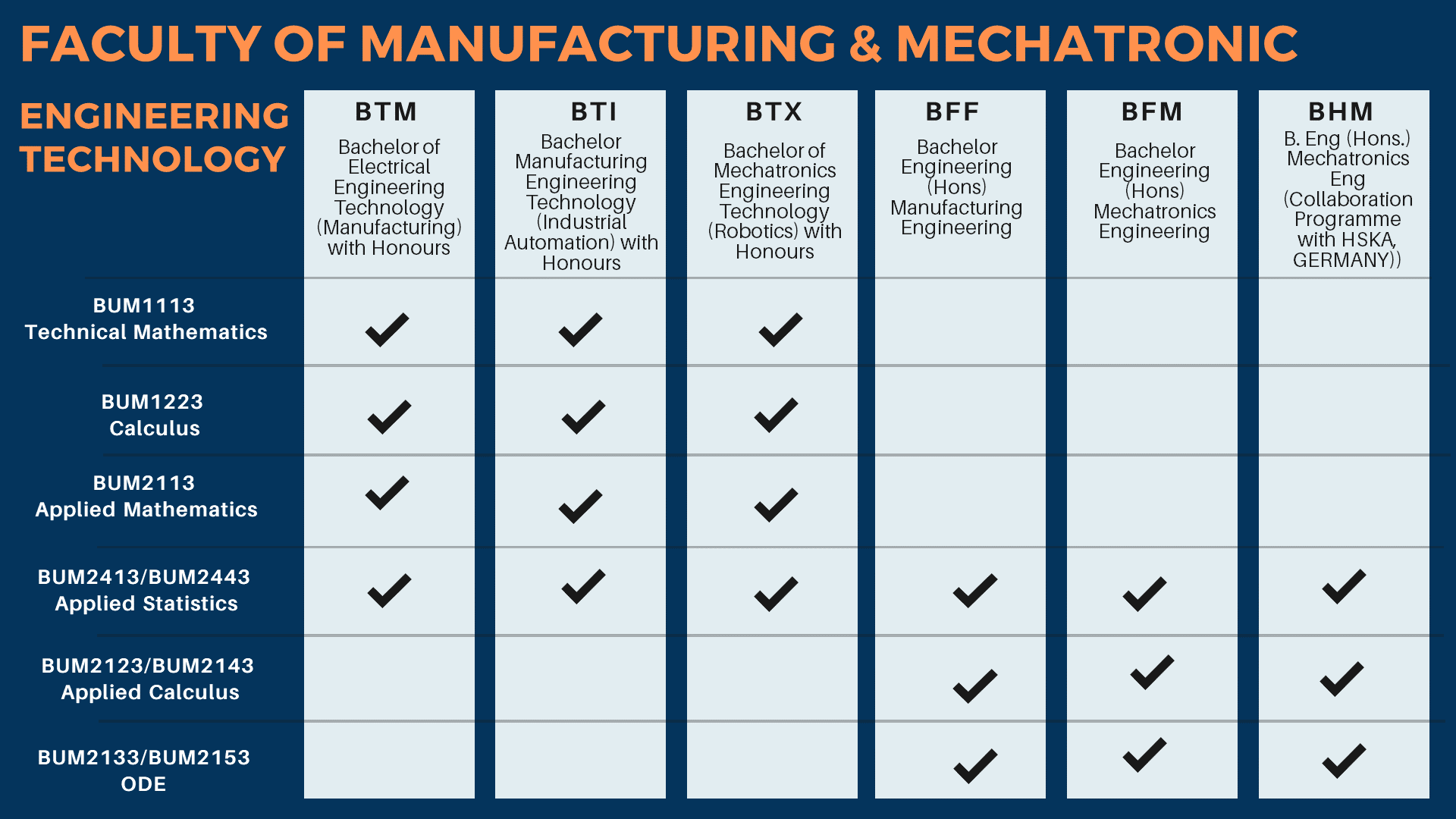
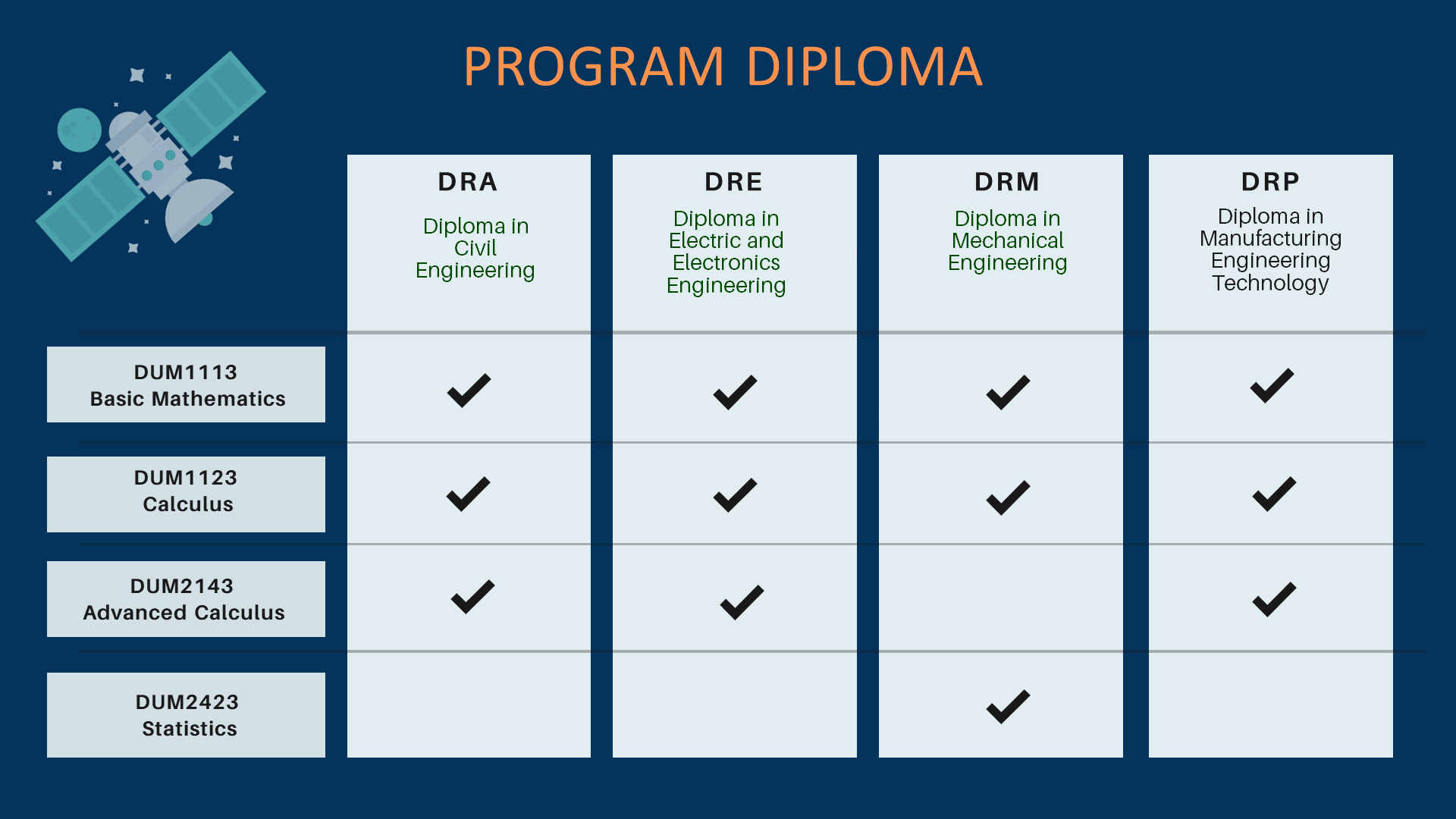
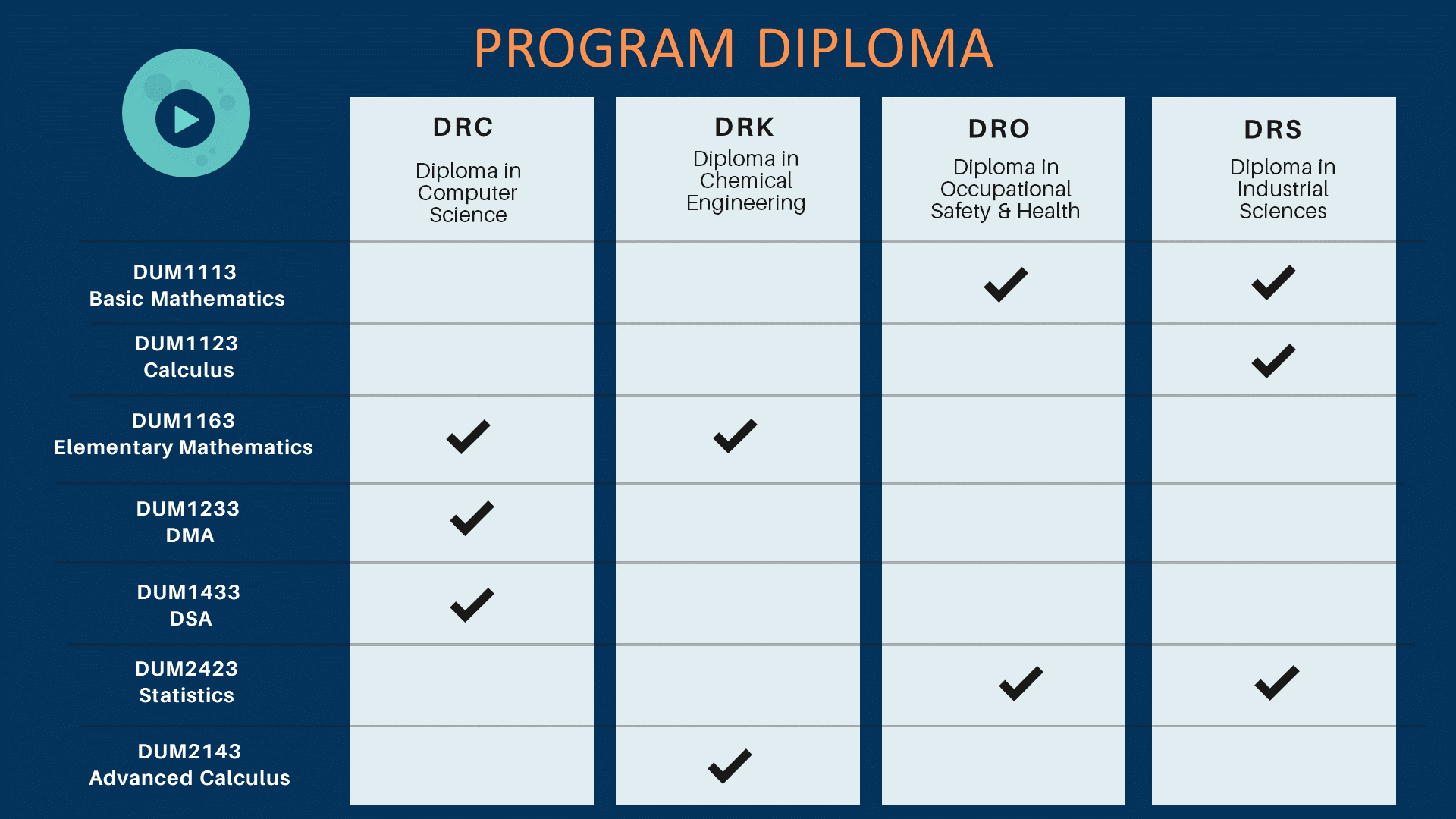
- Students who have obtained a diploma or higher academic qualification of an accredited programme are eligible for the consideration of credit transfer
- The course mapping must achieve at least 80% similarity in course content and learning outcomes
- Application for credit transfer must be done in the first semester during the stipulated period unless with the approval of the Dean
- Minimum grade is C - achieving minimum UMP course passing grade
Proses Kerja Pendaftaran Manual Kursus Servis Matematik
